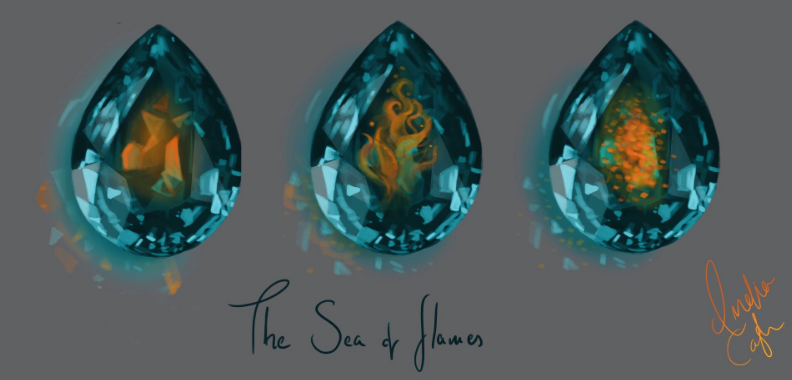blindness: a blessing or a curse?

Album cover for SZA's album, SOS
SZA once sang, "I can't see, I'm blind... blind, blind, blind" -- but she didn't mean it literally. Conflicted by her unhealthy relationship and her longing for love after past trauma, she attempts to indulge her desires by becoming "blind" to the toxicity of her relationship. Like SZA's "blindness" of the hopelessness of her situation, many characters in literature are also "blind" to the truth.
While discussing How To Read Literature Like a Professor, we've established that a character's blindness in literature always has some sort of meaning. For example, the author examines the irony of blindness in Oedipus Rex, in which Oedipus, who initially has the ability to see, is imperceptive to the truth; conversely, Tiresias is unable to see but recognizes Oedipus's real fate. But, the author urges us as readers to find the deeper so-what, and so the question that arises is this: beyond this juxtaposition between two contrasting characters, what was the deeper rationale for including the idea of blindness in Oedipus, and more broadly, in literature?
The Oxford Dictionary defines blindness as 1) "condition of being unable to see" and 2) "the fact of not noticing or realizing something", a trait that we can observe in Oedipus. Helen Keller also made this distinction between the two polarizing aspects of blindness:

"The only thing worse than being blind is having sight but no vision." -Helen Keller
Thus, the ability to see is only a facade; we can only discern a character's essence based on their vision, which encompasses the understanding of purpose and direction, clarity of morals, and much more.
Blindness is a curse -- for Oedipus, at least. Killing his father and marrying his mother may have been an inevitable (and unfortunate) series of events, but his inability to see the detriment of his own hubris and rashness is his tragic flaw. Even before (literally) blinding himself, he is already blind; his lack of vision transcends his ability to see.
Yet, blindness can also be a blessing. In All the Light We Cannot See (see trailer here), Marie-Laure's blindness saves her life -- a diamond notoriously named the Sea of Flames, whose beauty is rumored to blind its owner with power and eventually kill them, cannot influence her.

Marie-Laure possesses the real Sea of Flames; the other two are fake.
Moreover, her blindness allows her to find the beauty in life and human connection amidst merciless war. Learning to appreciate knowledge and experiences, her vision leads her to become a successful scientist, discovering new species and exploring new places; more importantly, she spreads her vision to others through her secret radio, saving lives with her refreshing perspective on life.
I don't want to say that there is beauty in blindness, but there is beauty in the way vision can be transformed. The short story 20/20 is an excellent example -- the progression of the way Ruthie is portrayed, from being dull to being "capable of wonderful sights," shows that even a close-minded mindset like the one Bill possesses at the start can change. The transformation of their relationship, through even the subtlest of interactions, allows them to find balance between their different personalities, as symbolized by the title "20/20" (as well as clarity of vision). It is truly beautiful that a shift in vision can create newfound harmony between two people.
However, it's important to note that every character or person has a flawed vision in one way or the other; all human beings are "blind" to some degree. Some, like Oedipus, are more blind than others -- but even characters like Marie-Laure lack awareness of the full scope of reality. Constantly coddled by her father, Marie-Laure has a sheltered view of the world outside her house and resists change (initially, at least), showing her vulnerability as she seeks understanding and human connection. She also makes naive decisions, like putting Uncle Étienne and Madame Manec at risk by not surrendering the radio collection in the attic to the Germans.
It seems as though the only thing keeping Marie-Laure from harm is the blessing of her vision -- which is exactly what the author intends. By intentionally protecting her, the author conveys the importance of resilience in the face of tremendous adversity, compassion for others, and courage that Marie-Laure illustrates.
Ultimately, blindness in literature is used not only to show its duality, but also to highlight a character's flaws or capacity to understand the world in unique ways. For Oedipus, it's the former -- his ignorance shows the detriment of hubris -- and for Marie-Laure, it's the latter. In both cases, though, the interplay of the blessings and curses of blindness invites us to contemplate the intricacies of characters, and furthermore, of human experiences.

We can also apply the idea of sight and vision to us as readers. Depending on the point of view, our sight of the plot in a story may be distorted, affecting our judgment of events and other characters. For instance, in chapters in Marie-Laure's point of view, we see her world in an optimistic lens, where war is simply an adventure for her to discover the wonders of the outside world; on the other hand, Werner's perspective reveals the darker aspects of humanity that emerge during war. By seeing both sides, we can begin to appreciate Marie-Laure's ability to find beauty in the midst of adversity. Reader response criticism might also play a role in this -- since we can assume most readers are not blind, they may identify less with characters who are blind, strengthening their impression of blind characters compared to others.
By understanding the difference between sight and vision, we can begin to grasp the nuances of a story and recognize that a character's perspective can also affect how we perceive them; through this lens, we can comprehend the complexities of characters. The union of different experiences readers have while reading a text allows us to appreciate the different ways in which characters, like Marie-Laure, can resonate with readers.

Comments
Post a Comment